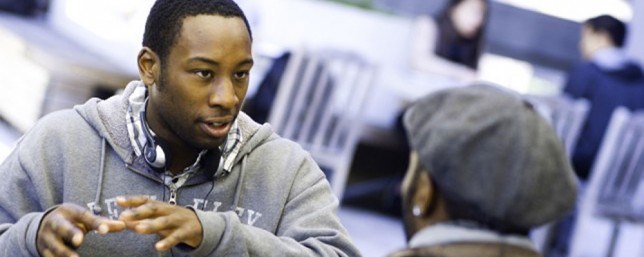Overview
The Designated Emphasis (DE) in Critical Theory permits interested students to specialize in critical theory and to obtain certification of this specialization, while pursuing a PhD in an established UC Berkeley department. Critical Theory is not an independent degree granting program. Students admitted to the DE and completing the requirements will receive a parenthetical notation to that effect on their doctoral degrees.
Critical Theory is typically associated with the work of the Frankfurt School, and that tradition of theory figures significantly in the DE curriculum. However, the program at Berkeley broadens and extends the meaning of critical theory to include 19th century philosophers of critique and contemporary critical theoretical work on culture, religion, nationalism, post-nationalism, identity, and capitalism. Above all, Critical Theory at UC Berkeley emphasizes the centrality of theoretical critique to the examination of contemporary values, conflicts among schemes of values, the powers that organize political, social, cultural, and economic life, and modes of justification and legitimization for cultural inquiry and political analysis.
Undergraduate Program
There is no undergraduate program in Critical Theory.
Graduate Program
Critical Theory : Designated Emphasis (DE)
Courses
Critical Theory
CRIT TH 200 Critique in 19th-Century Thought 4 Units
This course will examine various formulations of critique in 19th-century theory. Thinkers who may be studied include Kant, Hegel, Marx, Nietzsche, and Weber, though the selection will vary by instructor. This is the "foundations" course for the Designated Emphasis in Critical Theory.
Rules & Requirements
Prerequisites: Admission to the critical theory designated emphasis or consent of instructor
Repeat rules: Course may be repeated for credit. Course may be repeated for credit when topic changes.
Hours & Format
Fall and/or spring: 15 weeks - 3 hours of lecture per week
Additional Details
Subject/Course Level: Critical Theory Graduate Group/Graduate
Grading: Letter grade.
Instructor: Brown
CRIT TH 205 The Classical Frankfurt School: The First Generation of Critical Theory 4 Units
This course will explore the founding texts of the Frankfurt School's first generation: Horkheimer, Adorno, Benjamin, Marcuse, Lowenthal, and their circle. It will follow the development of critical theory through its Weimer years, American exile, and return to postwar Germany.
Rules & Requirements
Prerequisites: Admission to the critical theory designated emphasis or consent of instructor
Hours & Format
Fall and/or spring: 15 weeks - 3 hours of lecture per week
Additional Details
Subject/Course Level: Critical Theory Graduate Group/Graduate
Grading: Letter grade.
Instructor: Jay
CRIT TH 240 Contemporary Critique and Critical Theory 4 Units
This course will explore various contemporary engagements with the foundations of critical theory in relation to other histories and locations. Topics will vary by instructor but may include: post-continental political theory, critique and the problem of political dissent and citizenship, gender and race in relation to critical practices, psychoanalysis, and literary and art theory and criticism.
Rules & Requirements
Prerequisites: Admission to the critical theory designated emphasis or consent of instructor
Repeat rules: Course may be repeated for credit with consent of instructor. Course may be repeated for credit when topic changes.
Hours & Format
Fall and/or spring: 15 weeks - 3 hours of lecture per week
Additional Details
Subject/Course Level: Critical Theory Graduate Group/Graduate
Grading: Letter grade.
CRIT TH 290 Critical Theory Elective 2 - 4 Units
Critical Theory electives are taught by core and affiliated faculty in the Critical Theory program and offer important treatments of theoretical materials significant to the intellectual traditions of the program's course of study in nineteenth-century social theory and philosophy, Frankfurt School and related currents in theory and criticism, and contemporary critical theory. In a typical Critical Theory elective, theoretical materials are presented in dialogue with an anthropological, artistic/aesthetic, economic, educational, historical, philosophical, political, rhetorical, sociological, or other disciplinary matrix that constitutes the course's primary materials for study and inquiry.
Rules & Requirements
Prerequisites: Admission to the Critical Theory Designated Emphasis or consent of the instructor
Repeat rules: Course may be repeated for credit when topic changes.
Hours & Format
Fall and/or spring: 15 weeks - 2-3 hours of seminar per week
Additional Details
Subject/Course Level: Critical Theory Graduate Group/Graduate
Grading: Letter grade.
Contact Information
The Program in Critical Theory
4327 Dwinelle Hall
Phone: 510-642-1328
Fax: 510-642-2510
Program Co-Director
Martin Jay, PhD (Department of History)
3321 Dwinelle Hall
Phone: 510-642-7218
Program Co-Director
Robert Kaufman, JD, PhD (Department of Comparative Literature)
4407 Dwinelle Hall
Student Affairs Officer and Program Coordinator
Carrie Malcom
